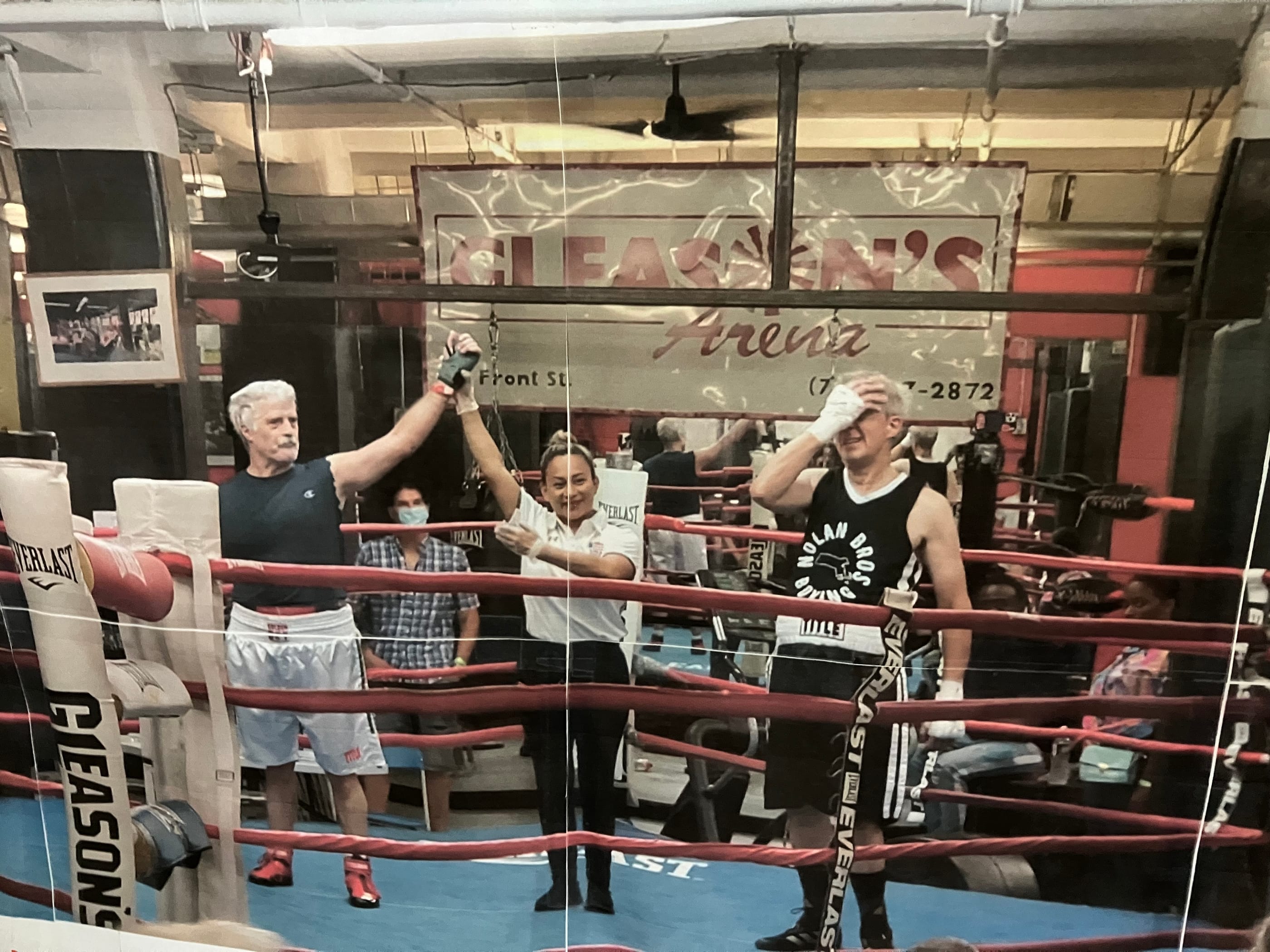My first fight was in New York City at the famous Gleason’s Gym. I fought Friday and Saturday night and brought home the belt scoring two first rounds TKO’s over my opponents. My hard work with Joe and sparring put me on top!
Now I was hooked! Boxing is performative, friends, family and others crowd the gym to watch you fight. Your opponent wants to win just as much as you. You put yourself on the line and have no control over who your opponent will be. The waiting and hours of training are over. It's go time, the bell rings and you engage, the spectators press closer while you try to stay calm hoping your hard work and training will pay off. You take some shots, and you try to give some right back. Your vision tunnels to just the other guy. You do you best to stay calm enough to think the fight as well as maneuver physically. One loses the other wins but as they say, just getting in the ring is a win.
I fought again in New York the following year. My first fight was a first round TKO. The second fight was an absolute, all-out three-round war against an experienced, tough guy that gave his all. We stood toe to toe and just rained punches on one another for three rounds, bloodying and exhausting one another. Between rounds I was gasping for breath. I did enough to win a split decision victory and brought home another belt.
In 2023 I came to New York again for my third master’s tournament at Gleason’s There was only one guy in my bracket so we fought on Saturday night for the belt. He was tall, muscular and agile. Extremely agile! Agile enough to do a standing vertical leap from the floor, over the ropes and into the ring.
We felt each other out for a few moments, then engaged. He hit me with a shot to the head that I was able to get my glove to but the sheer snapping force of the punch told me I was in with someone with a degree of power and speed I hadn’t faced before. I came forward but our feet got tangled and I ended up in the ropes. Then with about thirty seconds left in the round, he hit me with a solid left hook. Without awareness, I was off my feet and on the canvas. I looked into the crowd and my vision smeared. I shook my head and got to my feet and felt okay but wobbly. The referee came over and looked into my eyes. “Don’t stop it, I’m okay,” I said. He peered intently for a moment or two, then waved the fight over while shaking his head.
My first loss. How to handle it? I worked as hard or harder than I had for my other fights but still came up short. I was mindful of taking the loss as a good sport and congratulated my opponent. I went out to dinner with family and friends who had supported me and tried to keep my head up. I don’t think I could have beaten this guy under any circumstances, but still, it hurt to lose.
Later that night I woke up and came perilously close to vomiting. I continued to feel wobbly on my feet and my head ached. I tried to insist to my wife that my distress was caused by eating too much pizza after the fight. She said, “no dummy you have a concussion.” Thinking about it more realistically, I had to agree. This led to a subsequent discussion with her and my son, who has also sparred and understands the athletic psyche. They both shared how difficult it was to watch me get knocked down. They encouraged me to retire given that I was now sixty-seven and in their minds, I had no more left to prove.
I texted one of my coaches to let him know I’d lost and was trying to figure out my next steps. His thoughtful response: “We both know the risks fighters take, both amateur and pro, two people go into the ring and only one hand gets raised up. We are getting older, our reflexes are slowing down and some injuries are not easy to deal with.”
Finally, I hatched up a plan that made sense, one that I hoped would satisfy my family, though looking back it was a bit diabolical. I told them I would see my doctor, tell him I had been concussed and would then follow his advice. I promised them. I figured he would tell me to not spar or fight for a couple months then would green light me to get back in the ring.
The day of the appointment came and I hopped up on the table and launched into my story. I concluded, looked up at him and said, “so what do you think, Doc?”
“I think you should retire.”
I wasn’t sure I heard him right, or perhaps I was so stunned by his response that I hoped I heard him wrong. “Wait, what?!”
“I said,” he responded, “you should retire.”
“Why?”
“I’ve been a fight doctor for years, boxing, MMA and other martial arts. When you get a concussion, your cognitive baseline slips. When you spar you get micro concussions, even with good headgear. These can be cumulative. A concussion kills brain cells and when this happens, they don’t degrade, they liquefy. A guy your age shouldn’t play around with your cognitive health. You need to retire.”
Stunned, I thanked him and left the office. I take my word seriously. My family is integral. I promised them I would follow doctor’s orders, so I had no choice but to retire. As an older athlete, I am used to the slowing of my abilities but I hadn’t had to stop any of my activities until now. I told my wife and son. They were visibly relieved. I knew I could continue to train but no sparring or fighting. That chapter is over.
I'm still training. I hit the heavy bag, hit mitts and remain in shape but, my sparring and fight days are over. I gave my word. I miss the excitement of getting in the ring and putting myself and my abilities on the line. Boxing pushed me to the very maximum of my physical abilities. Beyond what I thought I was capable of. It taught me to better deal with my anger, frustration and to push through obstacles. Because of boxing I am more confident and my self-esteem is improved. I know I can now defend myself and others if I need to. I will miss it. It has been hard to let go of fighting but I don’t want to risk my mental faculties and I can’t dismiss the concerns of my family. As I near seventy, it's a necessary but rueful letting go.




Comments